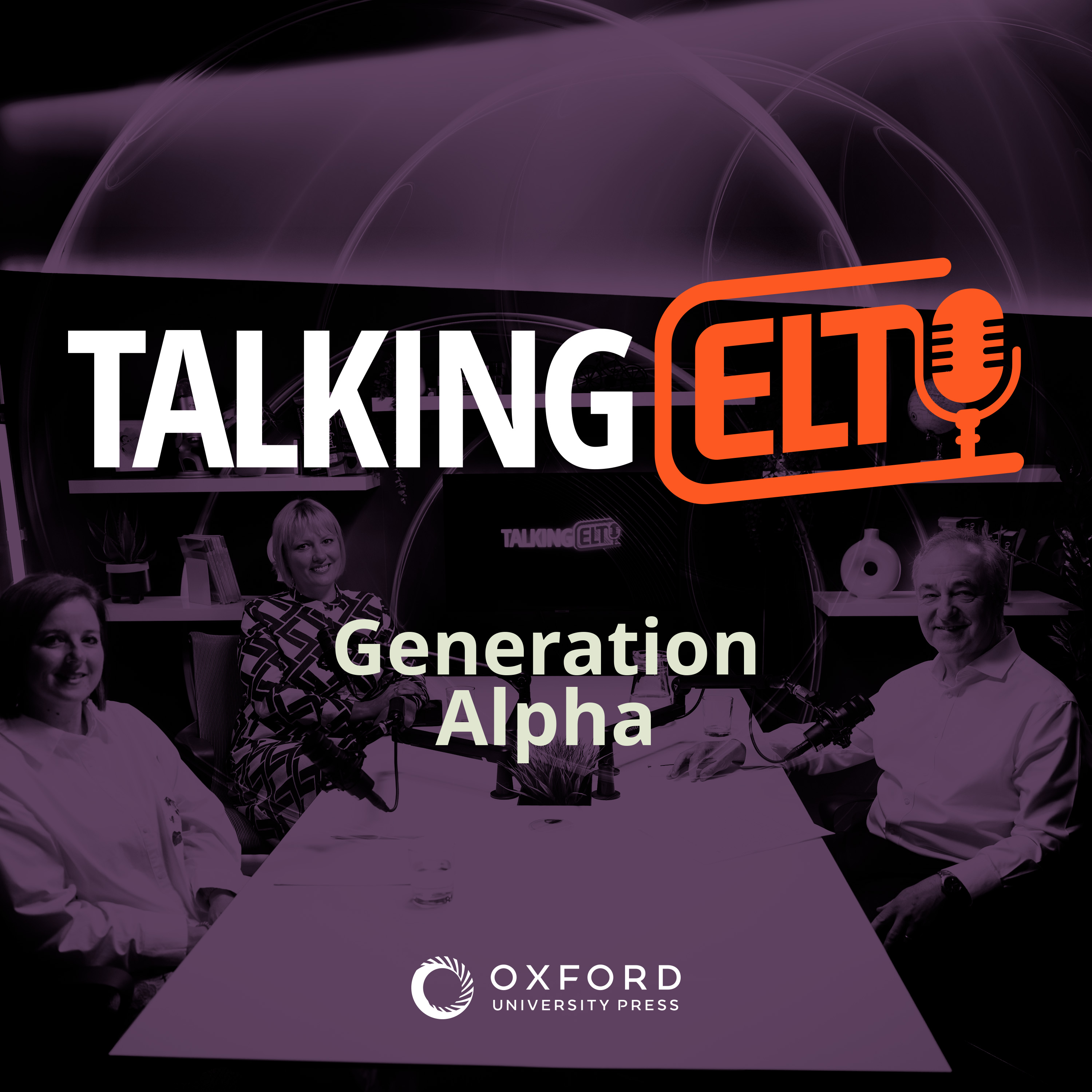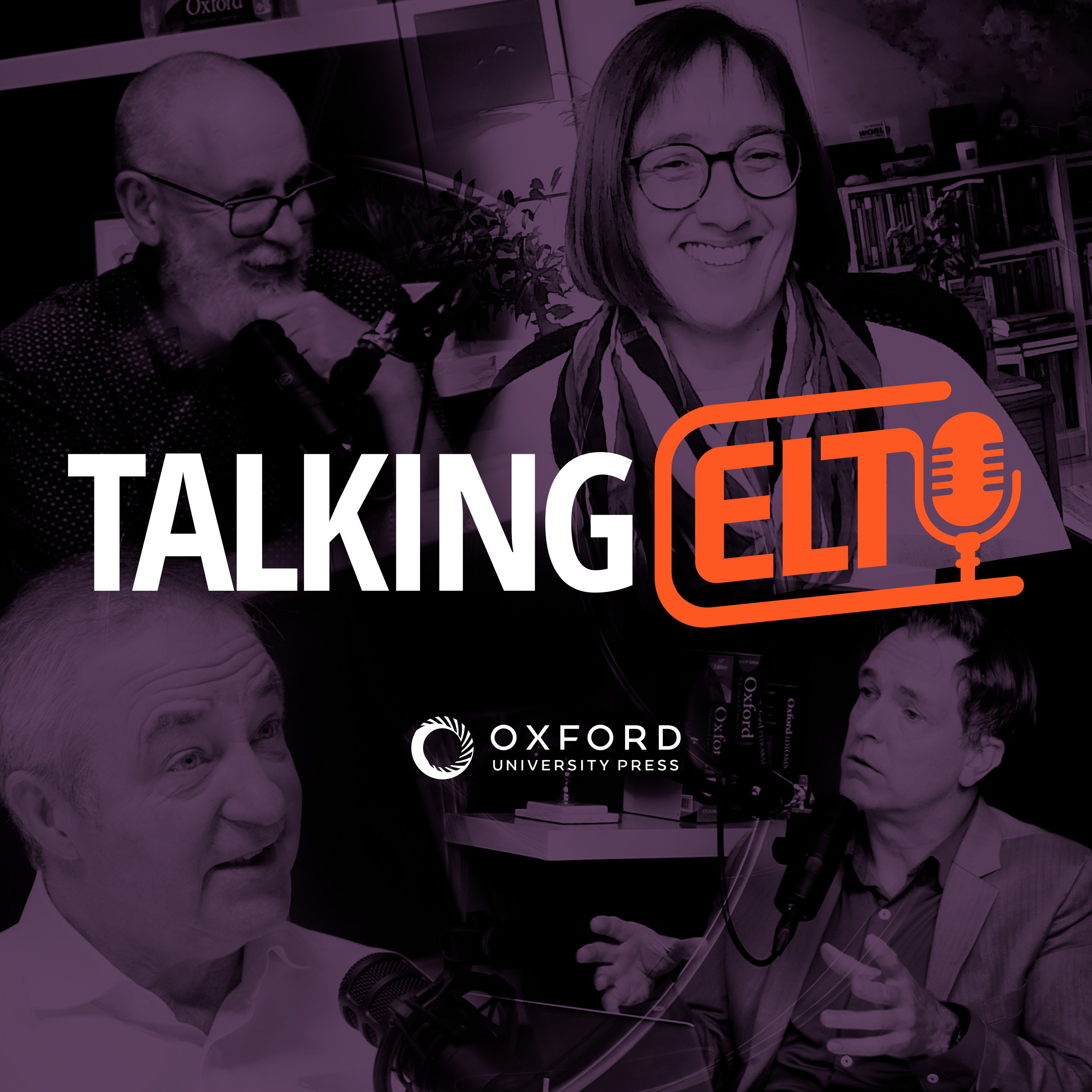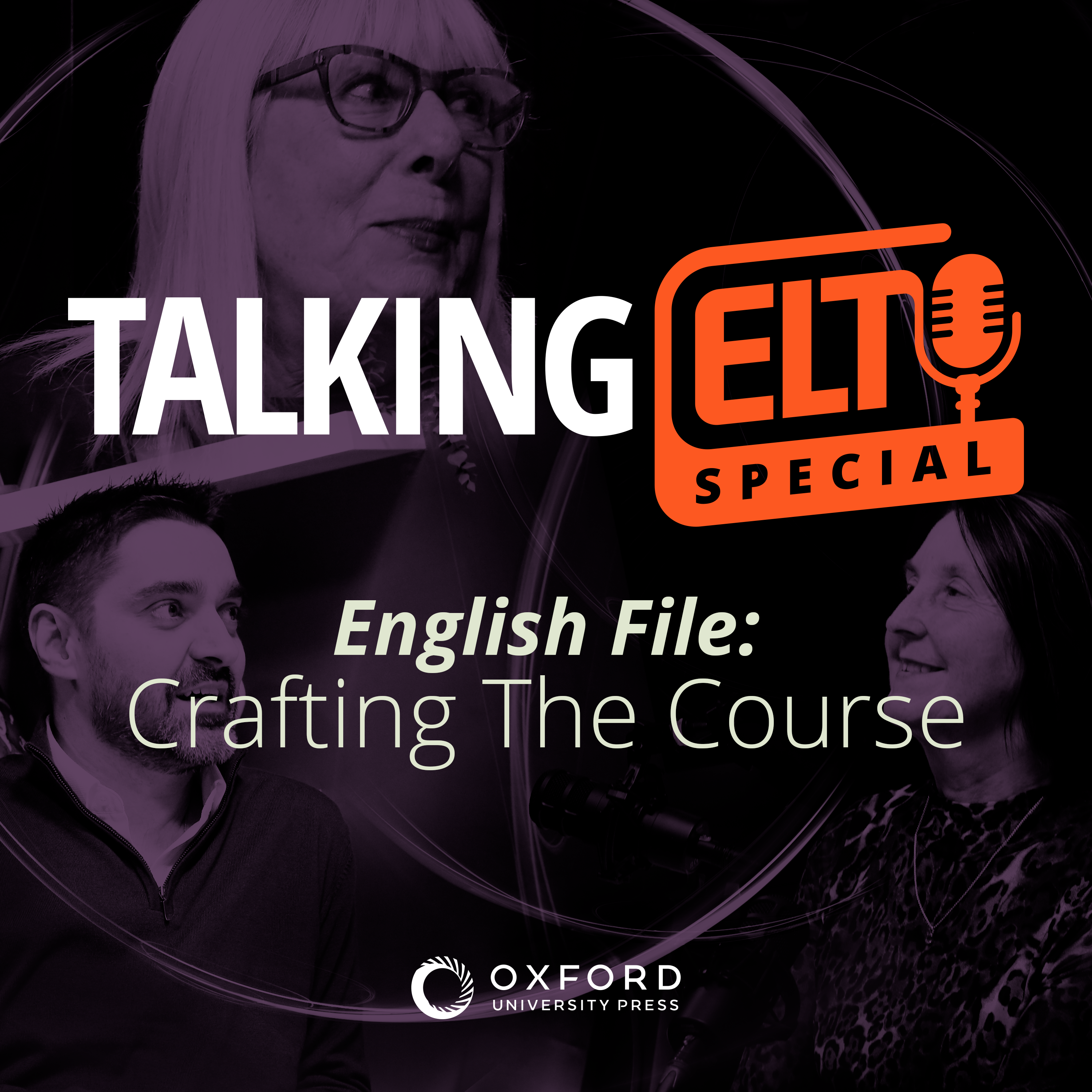Episode Transcript
[00:00:11] Speaker A: Hi everyone, and welcome to Talking ELT, the easiest place to learn about the big issues in language teaching. We're here to cover the topics that you're interested in, and today we're going to be talking about artificial intelligence. I'm joined by Ben Knight, head of Research and Pedagogy at Oxford University Press and Haya Reindeers Professor of Tsol and Head of Research at Anaheim University. Thanks for joining me, guys.
[00:00:33] Speaker B: Good morning.
[00:00:34] Speaker C: Pleasure.
[00:00:35] Speaker A: So before we start, one quick note. Today we're not going to be talking about the practical applications of AI in the classroom or giving tips or ideas. Ben's actually done a talk on that at our ELT online conference. So if you want to learn about the practical issues around AI and how you can use it in your teaching, go watch that. We'll include a link in the description. Today's conversation is going to be more about the implications of AI for the future in the medium term, how is it going to impact teaching, learning, assessment? How is it going to change the way we approach things? What dangers are there? What possibilities are there, and what do we need to watch out for and how can we shape it?
So, yeah, I'd like to jump into that with both of you because to be honest, I know very little about this and I'm excited to learn from you guys. So my first question, I think this is really important to kind of set the scene. What do we mean by artificial intelligence? What kind of tools and platforms and areas are we talking about when we use this term?
[00:01:37] Speaker C: In my mind, when I talk about artificial intelligence, what I think of is getting computers or systems to do what we normally associate with humans doing with intelligence. So it's artificial. It's not a human, but it's doing the kind of things we associate with humans. So in that sense, it's a moving target.
[00:01:56] Speaker A: Okay?
[00:01:57] Speaker C: As we start to take things for granted as done by machines, and therefore we think other things are the realm of human intelligence, then our expectations of AI start to change.
[00:02:13] Speaker A: That makes sense. That makes sense.
[00:02:14] Speaker B: And Haya, would you absolutely agree with that? And it's also probably worth just pointing out early on in the conversation that AI is not something that just happened in the last six months with the arrival of Chat GPT. It's actually a very large range of developments, techniques, technologies that have been in emergence since the 1950s. And the reason why we're now talking about it is because it's come to a point, to an inflection point where it's in some ways now ready for mass consumption. And so we now have this interface like Judge Apt and other systems like It that everyday people who are not engineers or computer scientists can actually work with.
[00:03:00] Speaker A: Would you also say the rate of development is accelerating in recent years?
[00:03:05] Speaker B: Well, it has been, and that's generally the case. For computational technologies.
I think perhaps more interesting and important is that you see different developments in different fields and at some point they come together and suddenly because of they are coming together, things are possible. A lot of things are suddenly possible. You see what I mean?
It might be an incremental development in this area and in this area, but if they come together and suddenly you have this explosion of new ideas and possibilities, I think that's where we are at the moment which is both exciting and a little bit scary at the same time.
[00:03:42] Speaker C: Yeah. And I think particularly the advance in natural language processing that has meant the interface has become open to everybody, that we can speak naturally and we can understand the answers straight away, immediately. I think that's made it a bit of a watershed moment.
[00:04:01] Speaker A: That makes a lot of sense. One of the things you mentioned just now, which I thought was interesting is that AI has been around for a while and it's becoming more accessible. So that's why it's creating these changes and everyone's seeing it as this new thing. But of course we have lived through new technologies in the past. The Internet came around that changed everything. I remember when people were saying calculators in the classroom were going to mean that everyone lost their math skills.
Does anything set AI apart in terms of its impact? Is there anything that makes it distinct compared to the previous changes we've experienced?
[00:04:33] Speaker B: Good question.
[00:04:34] Speaker C: Yeah, I mean, even your example of the calculator. Well, it has had a huge impact. It does change the way that we do basic maths and you can carry it around and now it's on your phone and all that. So similarly with the Internet, it hasn't a big impact, but it hasn't changed the need for some of the basic skills that we still need for maths and for communication and for knowledge.
I think it's the same.
[00:05:03] Speaker B: Yeah. And just also to add on to that, I think one fundamental difference is that a calculator or even the Internet, although to a larger degree enhances what we do.
Whereas the difference with AI is that it has the potential already being realized now to learn by itself and to create realities if we want to go there, that we have not been able would not have been able to anticipate ourselves. And I think I think so. The answer is in some ways it is similar to another major technological change.
But I think the big question marks at the moment are around the things that we don't know. We don't know if that makes sense.
[00:05:48] Speaker A: Yeah, it can transform things in ways we're just not expecting. Right, okay, well, I would like to explore that a bit and talk about some of the ways it can transform teaching learning.
And I think let's probably start with what all our listeners are most interested in, which is what is the impact of AI going to be on teaching, on the way we teach, whether that's in the classroom, whether that's remotely I'd like to explore the impact on teaching practice and on Pedagogy, I guess. So I'm going to leave that quite open.
[00:06:24] Speaker B: That's a very big question. I know Chris is the master of asking these enormously broad questions.
[00:06:31] Speaker C: Well, I kind of feel this is an opportunity for you to start.
[00:06:34] Speaker B: Oh, thank you so much, Ben, for.
[00:06:36] Speaker C: Giving me he's very generous.
[00:06:37] Speaker B: He is. Well, look, in a way it's easy because there are so many different aspects that we could and probably throughout the conversation will end up talking about.
[00:06:45] Speaker A: Right.
[00:06:45] Speaker B: So there is not one possible answer here, because you've mentioned, for example, in class and out of class. Well, the answer to those two questions will be quite different. But let's start perhaps with the in class bit, right? Because you started off asking about teaching, and I think before we start discussing this and hopefully generating some thoughts on that through the discussion, I think we need to perhaps first delineate the time frame. We're not talking about how it will change in 30 years.
[00:07:18] Speaker A: Yeah.
[00:07:18] Speaker B: Because we just think it's no idea. We don't know. And I think it would be unhelpful speculation.
I also don't think we need to talk about how it will change teaching tomorrow or in the next six months, or even twelve months. Because apart from the occasional trial with Chat GPT, for example, I think AI is very far from being a common use in teaching at the moment. So really we're talking about maybe, say, in the next year to five.
And so I would say that we can probably divide up the conversation around this in terms of the different jobs that we have as teachers. So maybe we could start with generating creating materials and resources as one aspect, and then maybe we could talk about the delivery of content, the classroom instruction, or the feedback as a separate conversation. Would that help?
[00:08:17] Speaker C: As a I think I really like that approach because you're thinking about what does a teacher do? What does teaching involve? And then where does AI come into that?
You might even start with a teacher decide makes decisions about what's useful for the students to be learning.
And they're doing that almost on two levels. They're doing that on the level of if you're going to learn English and you're at this level, these are the kind of things that are useful for you to be learning.
If I'm going to learn a new skill somewhere, I need to find a teacher who is able to break that skill up into little bits. So there's that kind of curriculum syllabus thing, and then there is the what does this particular person really need?
So those are all kind of curriculum as a big picture and in the moment.
[00:09:11] Speaker B: Yeah, I think that's a very helpful starting point because you've mentioned different things and they all involve essentially curation. Right. I mean, that's one of the key roles that we have as teachers. It's still why, after having had the internet widely available to us for 25 years now, we still have jobs as teachers. Whereas in 19, 95, 96, people say, well, that's the end of education as we know it. But of course we curate the experiences. We also have a role in supporting our learners, in developing the ability to curate their own experiences. So, of course, teaching learners how to find the right resources online, choose appropriate materials, et cetera. So maybe we could dive into that topic of curation a little bit more because you mentioned at least two different layers there. One is that there's a layer of curation in terms of identifying what the key components are of the subject that is being learned or taught. Right. So in the case of English, for example, you have the different components of the English language and putting them together in a systematic way is what a good teacher does.
[00:10:14] Speaker A: Right.
[00:10:15] Speaker B: This comes before that, that relates to.
[00:10:16] Speaker A: That and helping build that journey.
[00:10:19] Speaker B: Yeah, exactly. The building blocks.
[00:10:20] Speaker A: Right.
[00:10:20] Speaker B: So it's that structuring process which then needs to be augmented by the insights that we have about our learners and what building block would be most appropriate for each individual learner. And sorry to really we're very far away from your original broad question.
[00:10:38] Speaker A: No, go for it.
[00:10:39] Speaker B: I think this atomistic approach is absolutely necessary, otherwise you just end up talking in generalities. So maybe we could talk about these two components separately, the systematization of the subject and the linking of that with the specific needs of individual students. Because I think AI will have a significant impact on both of those.
[00:11:02] Speaker C: I agree that, see, even when we talk about what you need to learn, what you need to master to be good at English so we have at the moment, a kind of canon of typical things that we think needs to be learnt at each and it's passed down generation. Generation of teachers is passed down. But actually, what we have the potential for now is to have a better understanding of what people need to be good at in order to communicate effectively, because we can build up that data from looking at people's attempts to communicate and that's something that hasn't been available to us. So I can see us changing our understanding of the curriculum as a result of data from AI.
[00:11:47] Speaker B: Yeah, absolutely. And a good example of one of the ways in which we've already been doing that is the use of corpora.
Using machine learning to identify patterns within large corpora, for example, has really informed well, the development of, for example, OUP's materials. Right. So that has been going on for decades. Right.
It also leads to questions around, as you started off saying, what is it that we think of as needing to be taught when we're talking about English at a particular level for particular purposes. And that, of course, has changed, as you say, from one generation to the next. So, for example, now we teach social use of language and language in use more than we did perhaps 20 or 30 years ago, but also the inclusion of, for example, digital literacies and critical literacies and all sorts of other things that were not thought of as being part of English language teaching a few decades ago. Now are. And I think, again, AI is probably going to have some impact on that too, at the very least, in the fact that we as teachers will now need to teach our learners how to make judicious use of this additional set of tools that is now available to them.
[00:13:02] Speaker A: I mean, like we did with the Internet, right?
[00:13:05] Speaker C: Yeah, that's right. And certainly, I mean, that's one of the interesting things of Chat GPD and Generative AI with Natural Language Processing for language teachers is that it's creating language in a way which was the challenge for a language learner. So it's changed the target to some extent of what you need to be good at. Just as you've said, that especially with written English language, we know that our students will be able to create texts which are accurate, well structured, from generative AI. So that isn't really going to be their challenge in the future. Their challenge in the future is going to be producing a text which is effective, which people want to read, which is interesting, which is persuasive. So those are different set of skills to what they face at the moment.
[00:14:02] Speaker B: Yeah. And texts that we're going off on a small tangent here, but briefly with texts that have, for lack of a better word, that have soul. Because just a few days ago, it was in newspapers today or yesterday, this sermon in a church, I can't even remember which country it was, where hundreds of people attended a sermon delivered by an avatar, completely generated by AI.
[00:14:26] Speaker A: Oh, that's interesting.
[00:14:28] Speaker B: And of course, that's a wonderful example because that is a type of experience that is not factual, it's not transmissive, it's not mechanical, it's something spiritual. And one of the comments of the attendees was that it was in terms of the content, et cetera, is factually accurate and it sort of made sense and what have you, but it just lacked soul.
[00:14:49] Speaker A: Yeah, that makes a lot of sense.
[00:14:52] Speaker B: Yeah.
[00:14:52] Speaker C: And in a way that comes back to, I think, how you started by talking about the roles of a teacher.
[00:14:59] Speaker A: Yes.
[00:14:59] Speaker C: And one of the roles of a teacher is that motivating creating that social motivation for students to learn.
And that's not going to go away.
[00:15:09] Speaker B: No. And that personal connection, knowing that there's someone who actually cares about how you're doing, what you're doing and so on, I think that is going to come even more to the forefront and in some ways will be easier to do as a teacher, because you'll have more time to invest in that aspect of your teaching. Because some of the more mechanical aspects of the job perhaps can be given over to AI.
[00:15:35] Speaker A: Thanks for listening to this episode of Talking ELT. We hope you join us for the next one. If you want to listen to the rest of our conversation or hear us talk about other important issues, please follow the link in the description we'll be listening episodes regularly across all major podcasting platforms, and you can find links to all our channels there. Hope to see you sooner.


